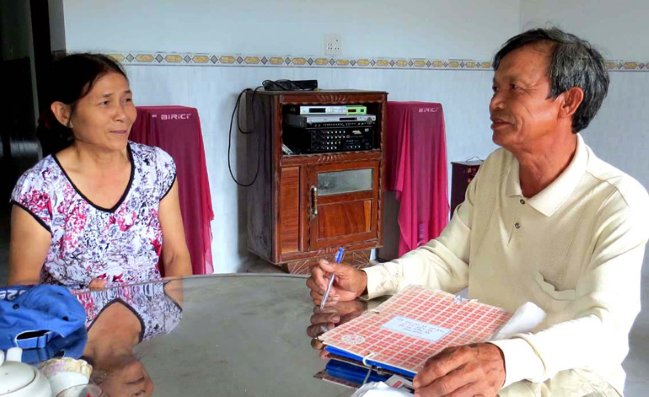The Law on Grassroots Reconciliation was approved by the National Assembly of the Socialist Republic of Vietnam on June 20, 2013. The law consists of 5 chapters and 33 articles, clearly stipulating the principles and policies of the State on grassroots reconciliation, mediators, and reconciliation groups; and grassroots reconciliation activities. The law takes effect from January 1, 2014, replacing the Ordinance on the Organization and Operation of Grassroots Reconciliation of 1998. The 2013 Law on Grassroots Reconciliation has supplemented several important new provisions in the reconciliation work as follows:

Illustrative image (source: Internet)
Regarding the scope of mediation: This is an important new point compared to the Ordinance. The Law stipulates the scope of mediation in an exclusionary manner, specifying only the cases that are not allowed to be mediated. Based on that, Article 3 of the Law on Grassroots Mediation states that grassroots mediation is conducted for conflicts, disputes, and violations of law, except for the following cases: Conflicts and disputes infringing upon the interests of the State, public interests; Violations of law concerning marriage and family, civil transactions that, according to the provisions of the civil procedure law, cannot be mediated; Violations of law that must be prosecuted for criminal liability or administratively penalized; Other conflicts and disputes that cannot be mediated at the grassroots level as per legal regulations.
Compared to the Ordinance, the Law supplements the state's policy on grassroots mediation, encouraging parties to resolve conflicts and disputes through grassroots mediation and other appropriate forms of mediation. It encourages reputable individuals within families, clans, and communities to participate in grassroots mediation and other suitable mediation forms. It also creates favorable conditions and support for grassroots mediation activities; encourages organizations and individuals to contribute and support grassroots mediation activities.
An important new point compared to the Ordinance is that the Law emphasizes the core role of the Vietnam Fatherland Front at all levels in the state management of grassroots mediation, reflecting the true nature of mediation as voluntary and self-governing, promoting democracy at the grassroots level.
The regulation on mediators is a new point of the Law compared to the Ordinance, with new and revised provisions regarding the standards for mediators; rights and obligations of mediators; procedures for electing, recognizing mediators, and cases of ceasing to be mediators to suit current conditions. Accordingly, individuals recognized as grassroots mediators must meet the following standards: be Vietnamese citizens residing permanently at the grassroots level, voluntarily participating in mediation activities; possess good moral character; have a good reputation in the community; have the ability to persuade and mobilize people; and possess legal knowledge. The election of grassroots mediators aims to strengthen democracy at the grassroots level, allowing people to directly select reputable and competent individuals as mediators. The Law stipulates the election of mediators in villages, residential groups through public voting or secret ballot at meetings of family representatives or by collecting opinions from family representatives. A person elected as a mediator must be approved by over 50% of the family representatives in the village or residential group. The head of the Front Work Committee prepares the list of recognized mediators and submits it to the Chairman of the commune-level People's Committee for the decision to recognize mediators. The decision to recognize mediators is sent to the Standing Committee of the commune-level Vietnam Fatherland Front, the head of the Front Work Committee, village heads, heads of residential groups, mediators, and is publicly announced in the village or residential group.
To help mediators avoid the situation of "serving the community without reward," the Law adds several rights and obligations of mediators to encourage them, including provisions on training in legal knowledge, mediation expertise, and skills; being provided with documents related to mediation activities. They shall receive remuneration per case when conducting mediation. They shall be commended according to regulations on emulation and commendation. They shall receive support and be facilitated in overcoming consequences if they meet with accidents or risks affecting their health and lives while conducting mediation activities, along with some obligations suitable to the new situation to overcome the limitations and inadequacies of the current team of mediators. The provision of more benefits for mediators compared to the Ordinance stems from the role and significance of grassroots mediation activities in recent times, affirming the significant contributions of mediators in resolving minor conflicts and disputes in the community.
A new point in the Law on Grassroots Mediation 2013 is the inclusion of gender equality issues in the principles of mediation activities. Accordingly, mediation work must ensure gender equality in organization and operation. This principle aims to implement gender equality laws while addressing occasional gender discrimination in mediation activities.
Regarding grassroots mediation activities, the Law on Grassroots Mediation has added new points specifically about the rights and obligations of parties involved in mediation activities. This is one of the new points of the Law. Article 17 stipulates that parties have the right to choose and propose mediators, locations, and times for mediation; to agree or refuse mediation; to request a pause or termination of mediation; to request that mediation be conducted publicly or privately; to express their will and decide on the content of the mediation resolution. At the same time, the mediator is obligated to accurately present the facts of the case and provide relevant documents and evidence; to respect mediators, rights, and related parties; not to disrupt security and order at the mediation site. The Law also provides for the assignment of mediators and invited participants in mediation; this provision aims to mobilize and encourage everyone in society to actively participate in resolving and mediating conflicts, legal violations, and small disputes in the community. Additionally, it supplements the responsibility of mediators to monitor and urge the implementation of successful mediation agreements.
The Law on Grassroots Mediation takes effect from January 01, 2014, and replaces the Ordinance on the organization and operation of grassroots mediation.
 Article table of contents
Article table of contents





.Medium.png)
.Medium.png)
.Medium.png)
.Medium.png)
